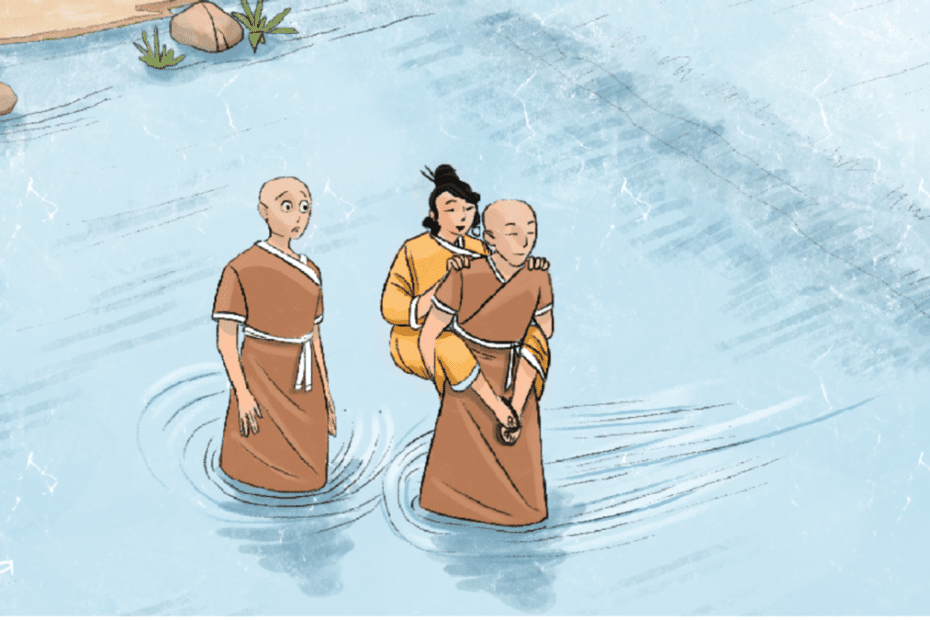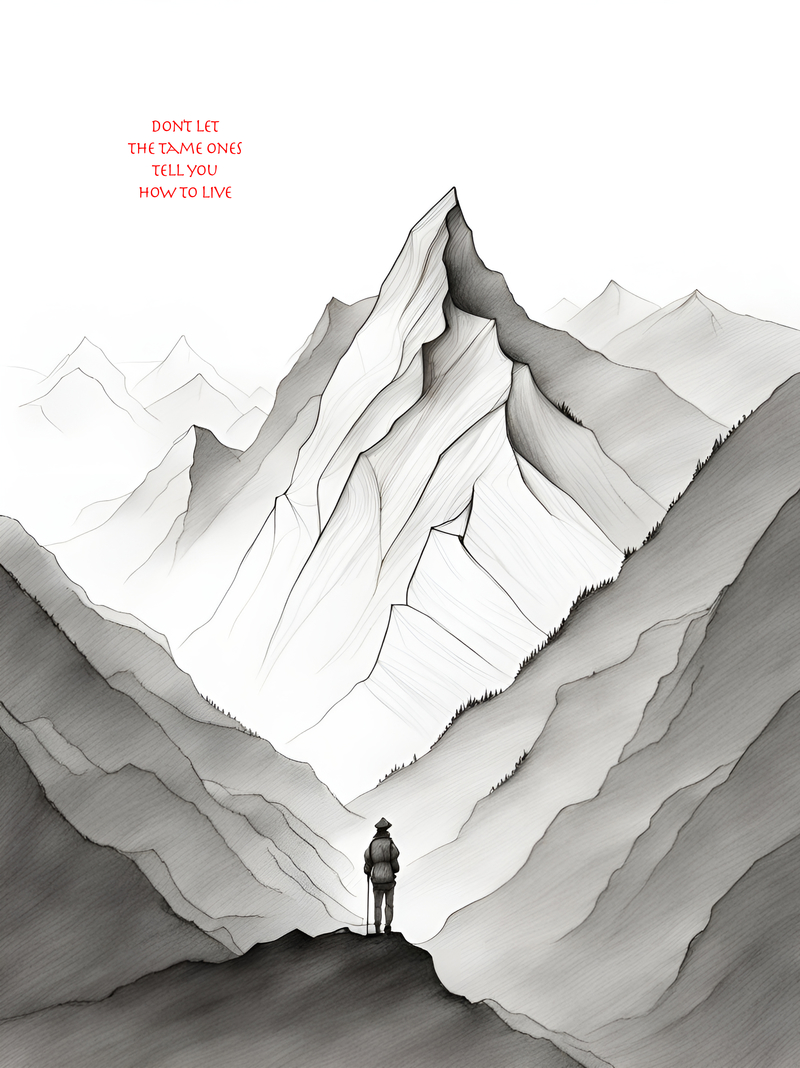Excerpt: The following is a short story about a monk who carried a wealthy woman across muddy water. What he says to his upset disciple may shock you.
NEW In The Shop: Don’t Let The Tame Ones Tell You How To Live [Poster]
Why We ♥ It: Some of the best advice I (Matt here) ever got was: don’t take life advice from people who aren’t living a life you want to live and don’t take criticism from people you wouldn’t go to for advice. I created this poster to act as a reminder to listen more closely to our role models and less closely to our critics, trolls, and tamed-comfort-zone-hugger acquaintances. It’s also a perfect gift for the outdoor adventurer, travel enthusiast, or solo explorer (or soon to be). Available in print or digital download. 👇🏼
...Want to advertise your book, product, or service? Send inquiries to matt@movemequotes.com.
The Zen Parable:
Once upon a time an old monk and his young disciple were walking past a wealthy woman standing next to a large puddle of water and mud.
Nobody was available to carry her across the water, so the old monk lifted her up and carried her to the other side.
It was quick and quiet.
The woman got off, didn’t thank the monk, and continued on her way.
The young disciple was shocked.
Several miles down the road, the young disciple was still upset over the incident.
“That woman was so rude,” he began.
“You were kind enough to carry her across the puddle and she didn’t even thank you!”
The old monk replied, “I put that woman down a long time ago.
Why are you still carrying her?”
The Moral:
I’ve carried grudges with me throughout my life more times than I’d care to admit—I think we all have.
When you feel as though you are wronged, naturally, your response might be to get upset and unless you’re an old monk zen master, just putting that “upset” down and letting it go can be quite hard. You want revenge. You want that person to own up to their “mistake.” You want that person to empathize with the upset feeling that you have so that your upset can be cancelled out.
And while it may very well feel like that’s the case—that our “upset” gets cancelled out by another person’s “upset”—what really happens is that both people feel the “upset” and you, then, are able to drop the grudge out of your mind and reconnect to the present moment.
The reality is, you would’ve gotten the same relief if you had dropped the grudge from the beginning.
Does this mean that the wealthy woman is justified in not saying thank you to the old monk who helped her cross the muddy way? No. But what it should illustrate is the idea that the person a grudge ever hurts the most—is the beholder.
The more “upset” you get over an occurrence, the more damage you’re going to cause yourself—not to the other person. And while you might think to yourself that the feeling of being “upset” is the fuel that is going to motivate you to make things right—you have to realize that, upon closer inspection, “upsetness” isn’t fuel at all.
NEW In The Shop: Don’t Let The Tame Ones Tell You How To Live [Poster]
Why We ♥ It: Some of the best advice I (Matt here) ever got was: don’t take life advice from people who aren’t living a life you want to live and don’t take criticism from people you wouldn’t go to for advice. I created this poster to act as a reminder to listen more closely to our role models and less closely to our critics, trolls, and tamed-comfort-zone-hugger acquaintances. It’s also a perfect gift for the outdoor adventurer, travel enthusiast, or solo explorer (or soon to be). Available in print or digital download. 👇🏼
...Want to advertise your book, product, or service? Send inquiries to matt@movemequotes.com.
The feeling of being upset, the mental practice of concocting all of the reasons why you should be upset, and continuing to spiral your thoughts to make the “upset” worse is far from being fuel and much more closely resembles poison.
Think about it. How does begrudging somebody serve you? What’s the higher purpose that it serves? It doesn’t.
It sickens you to a mental and physical halt (it becomes the main consumer of your brain’s resources and everything in your life gets affected)—this is far from being the fuel that perpetuates you forward to growth.
Here’s a funny exercise that comes from Ryan Holiday in his book, The Daily Stoic: think about all the upsetting things you don’t know about—stuff people might have said about you behind your back, mistakes you might have made that never came to your attention, things you dropped or lost without even realizing it.
What’s your reaction? You don’t have one because you don’t know about it.
In other words, it is possible to hold no opinion about a negative thing.
And by doing so, you free your mind to reconnect to the present moment as the old monk did after putting down the wealthy woman. By practicing the art of letting things go and putting down thoughts that have become heavy, you will release the poison from your system that hurting only you.
By letting go of what’s poisonous and heavy and freeing your mind, you’ll better position yourself to handle the prominent and immediate challenges of your day—the challenges that require your full and undivided attention.
Does this mean that we shouldn’t hold people accountable for wrong doings?
No. We should absolutely stand up for what is right and speak out against injustices. But demanding reciprocity does not stand as an injustice—let it go.
Demanding somebody be a person that holds up to your standards does not stand as an injustice—let it go.
Demanding that somebody acts their best at all times does not stand as an injustice—let it go.
Demanding that people are never rude does not stand as an injustice either, and so, as the wise old monk demonstrated above, let it go.
What are you still holding onto that you need to let go of?
What grudges are you still holding that are of not benefit to you and serve no higher purpose?
Let’s practice the ability of having absolutely no thoughts about something.
Let’s practice the art of acting as if we had no idea something ever occurred.
Let other people’s rude behavior become irrelevant or nonexistent to you and get on with your life.
I think we’ll all be much better off this way.
NEW In The Shop: Don’t Let The Tame Ones Tell You How To Live [Poster]
Why We ♥ It: Some of the best advice I (Matt here) ever got was: don’t take life advice from people who aren’t living a life you want to live and don’t take criticism from people you wouldn’t go to for advice. I created this poster to act as a reminder to listen more closely to our role models and less closely to our critics, trolls, and tamed-comfort-zone-hugger acquaintances. It’s also a perfect gift for the outdoor adventurer, travel enthusiast, or solo explorer (or soon to be). Available in print or digital download. 👇🏼
...Want to advertise your book, product, or service? Send inquiries to matt@movemequotes.com.

Written by Matt Hogan
Founder of MoveMe Quotes. On a mission to help busy people do inner work—for better mental health; for healing; for personal growth. Find me on Twitter / IG / Medium. I also share daily insights here. 🌱
It has taken me 1,000’s of hours to build this free library for you. If it has helped you, you can support my continued effort here. ☕️

